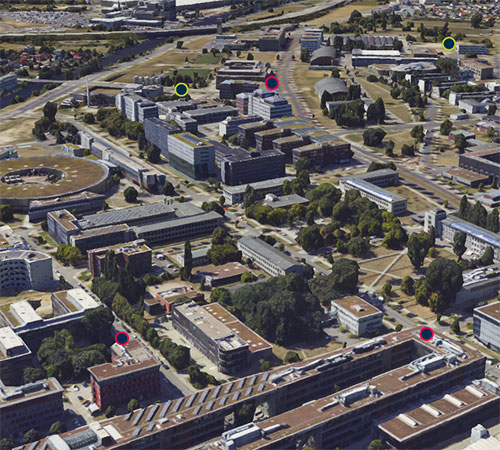Energy efficiency
The German capital region is home to extensive expertise and experience thanks to its ambitious climate protection goals.
On the way to climate neutrality by 2045, the capital region is successfully meeting the challenges of a cross-sectoral energy transition. Numerous companies are pioneers in the systematic implementation of efficiency measures – from energy generation and conversion, transportation and storage through to consumption. New energy efficiency technologies as well as energy services and new business models are developed and applied here.
The following energy efficiency technologies, among others, are playing an increasingly important role in the region:
- Environmental and waste heat utilization and storage
- Technologies for the efficient distribution and storage of heat and cold in buildings and districts
- Digital solutions for optimizing energy consumption in buildings and districts
Innovations and initiatives
The EUREF-Campus in the middle of Berlin is a symbol of the energy transition in Germany and a location for companies from the energy, sustainability and mobility sectors. Thanks to highly efficient technologies, the renewable energy supply is already CO2-neutral. In addition to combined heat and power plants, various renewable energy and storage systems, a central AI-supported control and regulation system is used.
In 2022, the Berlin Coordination Office for Circular Economy, Energy Efficiency and Climate Protection in Companies (KEK) was founded to support companies (especially SMEs) in the ecological transformation. By increasing energy efficiency, competitive advantages are created in the long term and economic potential is enhanced.
As the capital of digitalization, Berlin also makes important contributions to the development of energy-saving IT solutions. The Photonics Enhanced Data Centers project at the Fraunhofer Digital Networking Performance Center, for example, is working on ways to integrate photonic elements into data centers in order to significantly reduce their enormous energy consumption.
Networking and Funding
In the ”Infralab Energy Efficiency 2.0“ network, Berlin's energy supply and infrastructure companies exchange information on measures to save energy, increase energy efficiency and protect the climate. In the course of this, the network partners have created, among other things, the Berlin Wastewater Heat Atlas, which serves as a basis for the use of wastewater heat for heating and cooling. The 3rd network phase is currently underway with the aim of achieving final energy savings of almost 16,000 MWh/a.
In the second funding period of the Berlin Program for Sustainable Development (BENE2), projects that contribute to reducing emissions of climate-damaging gases through energy-efficient, technology-neutral solutions, e.g. conversion of heating systems to district heating/use of renewable energies, energy-efficient redesign of production facilities and processes, are funded under Funding priority 1 “Energy efficiency”.


